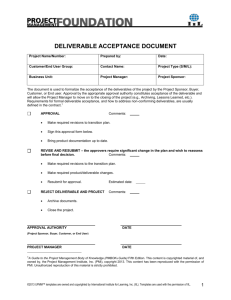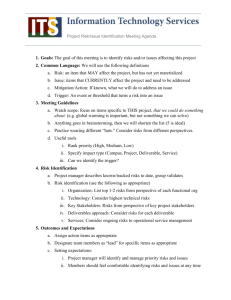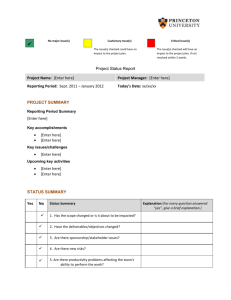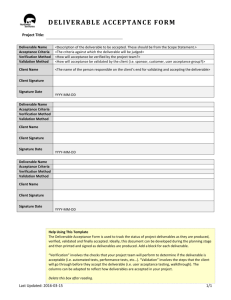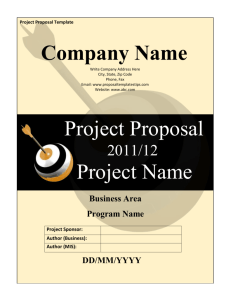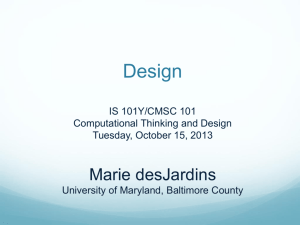6.0 Project Management and Controls
advertisement
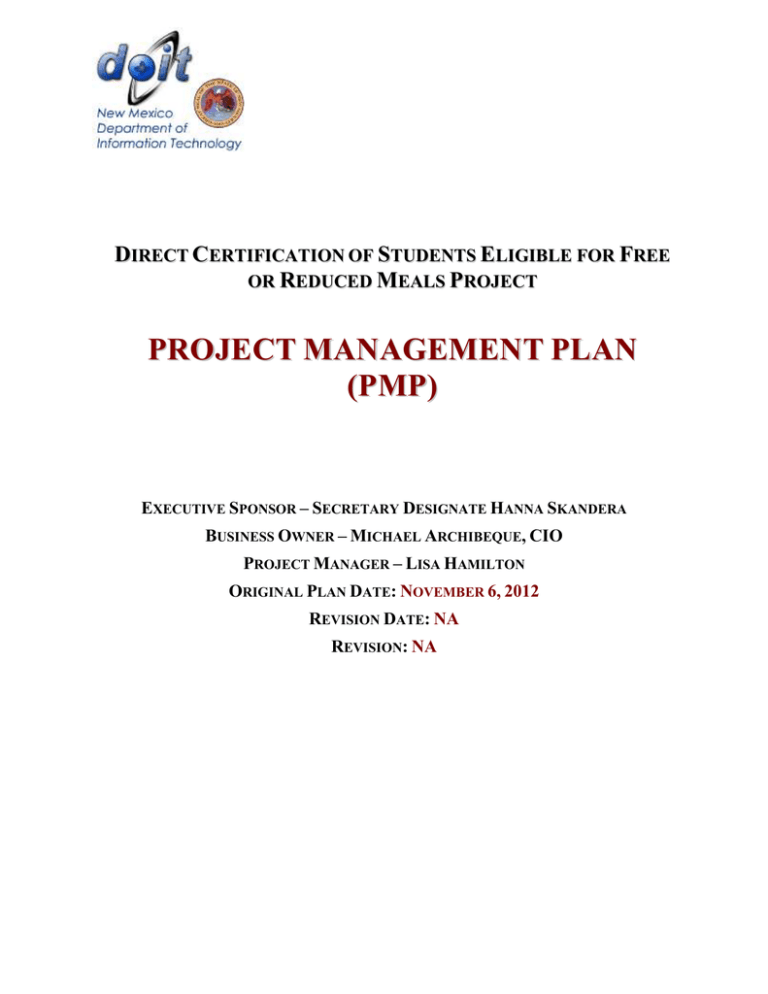
DIRECT CERTIFICATION OF STUDENTS ELIGIBLE FOR FREE OR REDUCED MEALS PROJECT P R O JE C T M A N A GEM E N T PLA N (PMP) EXECUTIVE SPONSOR – SECRETARY DESIGNATE HANNA SKANDERA BUSINESS OWNER – MICHAEL ARCHIBEQUE, CIO PROJECT MANAGER – LISA HAMILTON ORIGINAL PLAN DATE: NOVEMBER 6, 2012 REVISION DATE: NA REVISION: NA PROJECT MANAGEMENT PLAN FOR [PROJECT NAME] REVISION HISTORY................................................................................................................................................ III PREPARING THE PROJECT MANAGEMENT PLAN ................................................ ERROR! BOOKMARK NOT DEFINED. ABOUT THIS DOCUMENT ................................................................................... ERROR! BOOKMARK NOT DEFINED. PROJECT OVERSIGHT PROCESS MEMORANDUM – DOIT, JULY 2007 ERROR! BOOKMARK NOT DEFINED. 1.0 PROJECT OVERVIEW ......................................................................................................................................... 1 1.1 EXECUTIVE SUMMARY- RATIONALE FOR THE PROJECT 1.2 FUNDING AND SOURCES 1 1.3 CONSTRAINTS 1 1.4 DEPENDENCIES 2 1.5 ASSUMPTIONS 2 1.6 INITIAL PROJECT RISKS IDENTIFIED 3 1 2.0 PROJECT AUTHORITY AND ORGANIZATIONAL STRUCTURE .............................................................................. 3 2.1 STAKEHOLDERS 3 2.2 PROJECT GOVERNANCE STRUCTURE 5 2.2.1 Describe the organizational structure – Org Chart .....................................................................................5 2.2.2 Describe the role and members of the project steering committee ............................................................6 2.2.3 Organizational Boundaries, interfaces and responsibilities ........................................................................7 2.3 EXECUTIVE REPORTING 7 3.0 SCOPE .............................................................................................................................................................. 8 3.1 PROJECT OBJECTIVES 8 3.1.1 Business Objectives .....................................................................................................................................8 3.1.2 Technical Objectives ....................................................................................................................................9 3.2 PROJECT EXCLUSIONS 10 3.3 CRITICAL SUCCESS FACTORS 10 4.0 PROJECT DELIVERABLES AND METHODOLOGY ............................................................................................... 11 4.1 PROJECT MANAGEMENT LIFE CYCLE 11 4.1.1 Project Management Deliverables ............................................................................................................12 4.1.2 Deliverable Approval Authority Designations ...........................................................................................13 4.1.3 Deliverable Acceptance Procedure ............................................................................................................13 4.2 PRODUCT LIFE CYCLE ERROR! BOOKMARK NOT DEFINED. 4.2.1 Technical Strategy ........................................................................................ Error! Bookmark not defined. 4.2.2 Product and Product Development Deliverables .......................................... Error! Bookmark not defined. 4.2.3 Deliverable Approval Authority Designations ...........................................................................................16 4.2.4 Deliverable Acceptance Procedure ............................................................... Error! Bookmark not defined. 5.0 PROJECT WORK .............................................................................................................................................. 17 5.1 WORK BREAKDOWN STRUCTURE (WBS) 17 5.2 SCHEDULE ALLOCATION -PROJECT TIMELINE 17 5.3 PROJECT BUDGET 19 5.4 PROJECT TEAM 20 5.4.1 Project Team Organizational Structure .....................................................................................................20 5.4.2 Project Team Roles and Responsibilities ...................................................................................................21 5.5 STAFF PLANNING AND RESOURCE ACQUISITION 23 5.5.1 Project Staff ...............................................................................................................................................23 5.5.2 Non-Personnel resources .............................................................................. Error! Bookmark not defined. 5.6 PROJECT LOGISTICS 23 REVISION: 1.0 DOIT-PMO-TEM-020 i OF vi PROJECT MANAGEMENT PLAN FOR [PROJECT NAME] 5.6.1 Project Team Training ...............................................................................................................................24 6.0 PROJECT MANAGEMENT AND CONTROLS ...................................................................................................... 25 6.1 RISK AND ISSUE MANAGEMENT 25 6.1.1 Risk Management Strategy .......................................................................................................................25 6.1.2 Project Risk Identification ..........................................................................................................................25 6.1.3 Project Risk Mitigation Approach ..............................................................................................................25 6.1.4 Risk Reporting and Escalation Strategy.....................................................................................................25 6.1.5 Project Risk Tracking Approach .................................................................................................................25 6.1.6 ISSUE MANAGEMENT ................................................................................................................................25 6.2 INDEPENDENT VERIFICATION AND VALIDATION - IV&V 25 6.3 SCOPE MANAGEMENT PLAN 26 6.3.1 Change Control ..........................................................................................................................................26 6.4 PROJECT BUDGET MANAGEMENT 26 6.4.1 Budget Tracking ........................................................................................................................................26 6.5 COMMUNICATION PLAN 27 6.5.1 Communication Matrix .............................................................................................................................27 6.5.2 Status Meetings ........................................................................................... Error! Bookmark not defined. 6.5.3 Project Status Reports .................................................................................. Error! Bookmark not defined. 6.6 PERFORMANCE MEASUREMENT (PROJECT METRICS) 27 6.6.1 Baselines....................................................................................................................................................27 6.6.2 Metrics Library ............................................................................................. Error! Bookmark not defined. 6.7 QUALITY OBJECTIVES AND CONTROL 28 6.7.1 quality Standards ......................................................................................... Error! Bookmark not defined. 6.7.2 Project and Product Review AND ASSESSMENTS ......................................................................................29 6.7.3 Agency/Customer Satisfaction ..................................................................................................................29 6.7.4 PRODUCT DELIVERABLE ACCEPTANCE PROCESS .......................................................................................30 6.8 CONFIGURATION MANAGEMENT ERROR! BOOKMARK NOT DEFINED. 6.8.1 Version Control ..........................................................................................................................................30 6.8.2 Project Repository (Project Library) ...........................................................................................................30 6.9 PROCUREMENT MANAGEMENT PLAN 30 7. 0 PROJECT CLOSE ............................................................................................................................................. 30 7.1 Administrative Close .....................................................................................................................................30 7.2 Contract Close ..............................................................................................................................................30 ATTACHMENTS .................................................................................................. ERROR! BOOKMARK NOT DEFINED. REVISION: 1.0 DOIT-PMO-TEM-020 ii OF vi PROJECT MANAGEMENT PLAN FOR [PROJECT NAME] REVISION HISTORY REVISION NUMBER DATE COMMENT 1.0 July 27th, 2007 DoIT Project Management Office Revision 2.0 10-12-12 NMPED IT Division 2.1 2.2 REVISION: 1.0 DOIT-PMO-TEM-020 iii OF vi PROJECT MANAGEMENT PLAN FOR [PROJECT NAME] 1.0 PROJECT OVERVIEW 1.1 EXECUTIVE SUMMARY - RATIONALE FOR THE PROJECT The Student Nutrition Bureau (SNB) of the New Mexico Public Education Department (NMPED) seeks to: 1) develop an centralized electronic environment that will support the certification of students that are directly eligible for free or reduced meals based on status that is determined by data collected from the New Mexico Human Resources Department and the Children Youth and Families Division (CYFD); 2) share this data daily with the state and Local Education Agencies (LEA), private schools and Bureau of Indian Education (BIE) schools so that we can; 3) ensure that more of New Mexico’s neediest students are served meals at no cost; 4) integrate the Direct Certification Process with existing systems to achieve a single Student Nutrition Portal. 1.2 FUNDING AND SOURCES SOURCE AMOUNT US DEPARTMENT OF AGRICULTURE DIRECT CERTIFICATION GRANT $864,000 US DEPARTMENT OF AGRICULTURE FLOWTHROUGH FUNDS TO THE STUDENT NUTRITION BUREAU TBD ASSOCIATED RESTRICTIONS 1.3 CONSTRAINTS Constraints are factors that restrict the project by scope, resource, or schedule. NUMBER DESCRIPTION DIRECT CERTC01 TIMEFRAME TO MEET USDA TARGET IS NARROW. DIRECT CERT– C02 DECISIONS NOT MADE IN TIMELY MANNER. DIRECT CERTC03 DISTRICT AND SCHOOL PARTICIPATION AND FIDELITY OF USE. PAGE | 1 PROJECT MANAGEMENT PLAN FOR [PROJECT NAME] 1.4 DEPENDENCIES NUMBER DESCRIPTION TYPE M,D,E Direct Cert–D1 MOU FOR DATA EXCHANGE BETWEEN HSD AND PED M Direct Cert–D2 MOU FOR DATA EXCHANGE BETWEEN CYFD AND PED M Direct Cert–D3 HIRE STAFF M Direct Cert–D4 PCC REVIEWS. M Direct Cert–D5 FUNDING REQUESTS. M Direct Cert–D6 IV&V REVIEWS. M Direct Cert–D7 DC Implementation team established and functioning. Project timelines are being met and roles/responsibilities are well defined. M Direct Cert–D8 Direct Certification system will be developed and in place for testing. M Direct Cert–D9 Documentation of issues, actions taken to correct any issues and enhancements made. M Direct Cert–D10 List of identified LEAs, private and BIE Schools to participate in field testing. E 1.5 ASSUMPTIONS NUMBER DESCRIPTION Direct Cert–A1 Stakeholder participation and buy-in. Direct Cert–A2 Project leadership will have adequate time for project planning activities. Direct Cert–A3 Stakeholders will make decisions in a timely manner to support the project schedule. Direct Cert–A4 Individuals with different requirements and perspectives will work together to ensure project targets and outcomes are achieved. Direct Cert–A5 Project Team members will be assigned and allowed to spend the proper PAGE | 2 PROJECT MANAGEMENT PLAN FOR [PROJECT NAME] NUMBER DESCRIPTION amount of their time to complete their assigned tasks within a reasonable timeframe. Direct Cert–A6 The communication plan and timeline will be followed. 1.6 INITIAL PROJECT RISKS IDENTIFIED Risk 1 Description – MOUs required do not receive approval within timeframe required. Probability: low Impact: High Mitigation Strategy: Minimize impact by utilizing existing data for the project build Contingency Plan: Look to amend existing MOUs for data sharing Risk 2 Description – Staff not hired when needed Probability: low Impact: High Mitigation Strategy: Professional Services Contract through the Price Agreement List Contingency Plan: Continue to rely on existing resources. Risk 3 Description – Staff Turnover Probability: low Impact: High Mitigation Strategy: Professional Services Contract through the Price Agreement List Contingency Plan: Continue to rely on existing resources. 2.0 PROJECT AUTHORITY AND ORGANIZATIONAL STRUCTURE 2.1 STAKEHOLDERS Name Hanna Skandera Stake in Project Organization Title Executive Sponsor NMPED Secretary-Designate Michael Archibeque Project Director NMPED IT Chief Information Officer NMPED Regina Madrid Program Manager NMPED Lisa Hamilton IT Project Manager NMPED IT Data Quality and Analysis Manager PAGE | 3 Student Nutrition Program Manager PROJECT MANAGEMENT PLAN FOR [PROJECT NAME] TBD DC Coordinator Kevin Adkins DBA 2 for current Student NMPED Nutrition web-based modules. SNB DBA 2 TBD DBA Contractor (TBD) Programming/Database Support (Contractual Services) Jenny Ramos Content Area Expert Appleseed Rachel Moskowitz Content Area Expert NMHSD TBD Content Area Expert NMCYFD TBD (Retta Prophet retired) TBD Conducts pilot testing and provide input into errors LEAs, Private And BIE Schools Pilot site Local Student Nutrition Directors/Staff PAGE | 4 NMPED SNB DC Coordinator PROJECT MANAGEMENT PLAN FOR [PROJECT NAME] 2.2 PROJECT GOVERNANCE STRUCTURE 2.2.1 DESCRIBE THE ORGANIZATIONAL STRUCTURE – ORG CHART Executive Sponser NMPED Secretary Designate Hanna Skandera Project Director Michael Archibeque, CIO Project Management IT Project Manager Program Manager Lisa Hamilton TBD Internal Support IT Direct Cert Staff Program Staff External Support PAGE | 5 IV & V Content Area Experts Pilot Group Stakeholders Committee PROJECT MANAGEMENT PLAN FOR [PROJECT NAME] 2.2.2 DESCRIBE THE ROLE AND MEMBERS OF THE PROJECT STEERING COMMITTEE ROLE Project Sponsor RESPONSIBILITY Provide strategic direction and policy approvals where required. The Project Sponsor will champion the project within the organization and ensure the overall success of the project. Project Director Provide high level project oversight, vision, and direction. Determine and commit appropriate resources. Resolve issues and problems. Provides strategic direction to Program Manager. Provides oversight for the Project Manager, the IT contract, and other IT support provided to the Direct Certification Project. Program Manager Provides oversight for the Direct Certification; ensures all program timelines are adhered to. Works with the IT project manager, Student Nutrition Staff and external support (Content Area Experts, Stakeholders Committee, and the Project Pilot Group) concerning the SOW and project deliverables. Provides oversight of all reporting; provides project management certification, planning, scheduling, assessment, and reporting documentation in collaboration with the NMPED Chief Information Officer (CIO), the IT support team, the Student Nutrition Program Manager, and external support (Content Area Experts, Stakeholders Committee, Project Pilot Group and the IV & V contractor) The project staff will design, build, test and deploy product. Will meet regularly with IT Project Manager, Program Manager and Project staff to support, guide and inform the work of the project. Their involvement is essential to ensuring that user requirements will be satisfied by the end product. The IV & V contractor will evaluate the work or products of a particular phase to determine if the requirements of the phase have been fulfilled. This includes an evaluation of: IT Project Manager Project Staff Stakeholders Committee IV & V Content Area Specialists Project Pilot Group PAGE | 6 Project Management Quality Management Training Quality Management Requirements Management Operating Environment Development Environment Software Development System and Acceptance Testing Data Management Operations Oversight They will serve on the steering committee and provide Ad Hoc support as needed to every phase of the project. Highly motivated and competent stakeholders that will test and pilot the new Direct Certification System and related Student Nutrition web-based processes. PROJECT MANAGEMENT PLAN FOR [PROJECT NAME] 2.2.3 ORGANIZATIONAL BOUNDARIES, INTERFACES AND RESPONSIBILITIES Executive Sponser NMPED Secretary Designate Hanna Skandera Project Director Michael Archibeque, CIO Project Management IT Project Manager Program Manager Lisa Hamilton TBD Internal Support IT Direct Cert Staff Program Staff External Support IV & V Content Area Experts Pilot Group Legend/Description Interface and shared work/responsibilities of the internal core project team. Interface for the IT PM, PM and PD. Interface for External and Internal Project Support. PAGE | 7 Stakeholders Committee PROJECT MANAGEMENT PLAN FOR [PROJECT NAME] 2.3 EXECUTIVE REPORTING All documentation for the Direct Certification Project will reside in a project document library created on the SharePoint System. Deliverable/ Communication Recipient Delivery Method Frequency Responsible Party Project Status NMPED Written Monthly SNB Project Manager DoIT Monthly Project Report DoIT Email Monthly PED IT Project Manager IV&V Reports DoIT, Executive Sponsor, Steering Committee Email Monthly IV&V Vendor Weekly Project Status Project Team Members/Project Director Email/Face-to- Weekly Face/conference call Project Team Members Advisory Forum Meeting Advisory Forum Members, Executive Sponsor Face-to-Face Bi-Monthly Project Team Members/IT Project Manager/ Program Manager Special Communication As needed As needed As needed As needed 3.0 SCOPE 3.1 PROJECT OBJECTIVES 3.1.1 BUSINESS OBJECTIVES NUMBER DESCRIPTION BUSINESS OBJECTIVE 1 Increase the match accuracy for the Direct Certification of free and reduced meal eligible students. RATIONALE Since 2009 until 2011 the average accuracy rate has been 63%. The USDA requires at a minimum, an 80% rate to ensure our state’s eligibility for basic and supplemental USDA funding. ACCEPTANCE CRITERIA The USDA required Benchmarks for this project are: PAGE | 8 80% for 2011-2012 90% for 2012-2013 95% for 2013-2014 PROJECT MANAGEMENT PLAN FOR [PROJECT NAME] NUMBER DESCRIPTION BUSINESS OBJECTIVE 2 Increase participation of LEAs, private and BIE schools in the use of Direct Certification Data. RATIONALE The current decentralized system does not readily enable a measurement of certification at the local level. ACCEPTANCE CRITERIA The user logs of the Direct Certification System will record BUSINESS OBJECTIVE 3 Present Student Nutrition Information in a comprehensive and centralized way to stakeholders. RATIONALE The data for the direct certification students as well as other data sets exists in a variety of formats depending on the decisions of the local program. ACCEPTANCE CRITERIA The Direct Certification System is a central database that will receive and exchange data from HSD, CYFD, NMPED STARS database and local student nutrition programs. We can query data and generate verification, exception and other types of reports to validate the data. BUSINESS OBJECTIVE 4 Provide a portal that will assist in student nutrition program planning, implementation, and evaluation at the state and local level. RATIONALE The Student Nutrition Program offers two separate modules. The Direct Certification would be the third. We seek to maximize all modules by having a single portal. ACCEPTANCE CRITERIA All modules will meet interoperability requirements. participation. 3.1.2 TECHNICAL OBJECTIVES NUMBER DESCRIPTION TECHNICAL OBJECTIVE 1 To provide an interface to a two-tier matching system. This interface will afford the user a means to retrieve both automated (first tier) and probabilistic matching students. BUSINESS OBJECTIVE 1 Increase the match accuracy for the Direct Certification of free and reduced meal eligible students. TECHNICAL OBJECTIVE 2 The matching application will be made available to all LEAs, as well as training and focus groups, which will contribute to the success and acceptance of the application. BUSINESS OBJECTIVE 2 Increase participation of LEAs, private and BIE schools in the use of Direct Certification Data. PAGE | 9 PROJECT MANAGEMENT PLAN FOR [PROJECT NAME] NUMBER DESCRIPTION TECHNICAL OBJECTIVE 3 Identify all stakeholders and organize change management, steering, and user-training committees as required. BUSINESS OBJECTIVE 3 Present Student Nutrition Information in a comprehensive and centralized way to stakeholders. TECHNICAL OBJECTIVE 4 To integrate the three main Student Nutrition Bureau applications – Decision Support Toolkit, Student Nutrition Claims, and the new Direct Certification software – via the STARS data warehouse. The District and Location Codes created in STARS will be mapped to the location information of the three applications. The goal is to create a seamless experience for the end users and provide a standard means of integration. BUSINESS OBJECTIVE 4 Provide a portal that will assist in student nutrition program planning, implementation, and evaluation at the state and local level. 3.2 PROJECT EXCLUSIONS The Direct Certification Grant awarded to the New Mexico Public Education Department (NMPED) by the Us Department of Agriculture is intended 1) develop an centralized electronic environment that will support the certification of students that are directly eligible for free or reduced meals based on status that is determined by data collected from the New Mexico Human Resources Department and the Children Youth and Families Division (CYFD); 2) share this data daily with the state and Local Education Agencies (LEA), private schools and Bureau of Indian Education (BIE) schools so that we can; 3) ensure that more of New Mexico’s neediest students are served meals at no cost; 4) integrate the Direct Certification Process with existing systems to achieve a single Student Nutrition Portal. All data, processes and systems that do not meet the criteria outlined in items 1-4 above, fall outside the scope of this project. 3.3 CRITICAL SUCCESS FACTORS NUMBER DESCRIPTION QUALITY METRIC 1 PERFORMANCE TO SCHEDULE QUALITY METRIC 2 PERFORMANCE TO BUDGET QUALITY METRIC 3 QUALITY OF DELIVERABLES PAGE | 10 PROJECT MANAGEMENT PLAN FOR [PROJECT NAME] 4.0 PROJECT DELIVERABLES AND METHODOLOGY 4.1 PROJECT MANAGEMENT LIFE CYCLE Phase Summary of Phase Key Deliverables Initiating Project Charter approved. Project Charter Authorization to proceed with planning. Project Scope Business Requirements Business Case Assumptions Constraints Planning Approved Project Plan Project Plan Critical success factors Work Break down Structures Project Schedule Controlling Design Completed, Tested and Performance/Status Reports Modified iteratively until Corrective Action system requirements are met. Measurement Metrics Pilot of system will provide additional system performance Plan Change Requests metrics that could lead to Product Change Request deployment or product Risk Management changes. Issues Management Execution Project Deliverables Completed Actual efforts Deliverable or Product Acceptance Deliverable or Product Acceptance Closing Project Deliverables completion Lessons Learned PAGE | 11 PROJECT MANAGEMENT PLAN FOR [PROJECT NAME] 4.1.1 PROJECT MANAGEMENT DELIVERABLES Project Deliverables are work products or artifacts that are driven by the project management methodology requirements and standard project management practices regardless of the product requirements of the project. 4.1.1.1 [Project Specifications] Description - Work with various entities/stakeholders to develop specifications for use across systems involved in the Direct Certification work process. This deliverable should provide a detailed report that supports program and IT staff in attaining the next phase of the project. Deliverable Acceptance Criteria – The artifact will support development of the System Design Documents. Standards for Content and Format – Written report with Visio Diagrams. Quality Review - Stakeholders will review and finalize final project specifications. 4.1.1.2 [Acquire Source Code] Description – After reviewing state domain Direct Solutions, the Core Work Group will select a source and acquire it. Deliverable Acceptance Criteria – The code can be utilized and modified. Standards for Content and Format – QA Report Quality Review – Core Work Group and IV & V will evaluate. 4.1.1.3 [Project Management Plan] Description – A detailed Project Management Plan will be developed with the requisite features essential to implementing and managing all aspects of the project. Deliverable Acceptance Criteria – The Work Breakdown Schedule, Project timelines and project milestones will be completed with minimum adjustments for risks mitigated through the Risk management process. Standards for Content and Format – PCC and USDA Project Reports Quality Review – Core Work Group and IV & V will evaluate. 4.1.1.4 [Training Program and Materials] Description – Once the Product Deliverables have been achieved, a training program, timeline and materials will be developed for full deployment. PAGE | 12 Deliverable Acceptance Criteria – All artifacts, materials, modules and methods for training end and internal users will be complete. Standards for Content and Format – Training plan will meet Project Management Standards. PROJECT MANAGEMENT PLAN FOR [PROJECT NAME] Quality Review – Core Work Group and IV & V will evaluate. 4.1.2 DELIVERABLE APPROVAL AUTHORITY DESIGNATIONS Complete the following table to identify the deliverables this project is to produce, and to name the person or persons who have authority to approve each deliverable. DELIVERABLE NUMBER DELIVERABLE APPROVERS (WHO CAN APPROVE) DATE APPROVED PRJ-DEL-001 Project Certification PCC 8/22/12 PRJ-DEL-002 Project Management Plan (PMP) PCC 4.1.3 Deliverable Acceptance Procedure The acceptance procedure will follow the PMP timeline for deliverables which includes scope contingencies for rework, issues, and any other modifications required due to deficiencies in a deliverable. A formal Deliverable Acceptance From will be utilized. (Attachment C) 4.2 PRODUCT LIFE CYCLE Phase Summary of Phase Key Deliverables Planning Objective activities and development of a detailed software requirements specification (SRS) document. The requirements will be based on modification of existing probability matching software. Design documentation will be conducted utilizing an iterative AGILE methodology. SRS and initial Software Design Document (SDD). Implementation, testing and documenting Assignment and implementation of code modules will be conducted. Testing of these modules will take place based on the developed test plan. Internal developer and system documentation will be written. Code written and tested. Deployment and maintenance Product will be deployed to Deployment of product to all PAGE | 13 System documents, and required developer documents (i.e., Application Programming Interface) will be written. PROJECT MANAGEMENT PLAN FOR [PROJECT NAME] SFAs in phases. Maintenance of product (debugging, revisions, etc.) will be conducted. SFAs. Maintained and revisions conducted as required. 4.2.1 TECHNICAL STRATEGY The technical strategy will be the following: Ensure the product is sustainable by NMPED IT Bureau Ensure the product’s usability by the stakeholders Ensure the product meets current and future DC achievement goals. 4.2.2 PRODUCT AND PRODUCT DEVELOPMENT DELIVERABLES 4.2.2.1 [System Specification Requirements] The SSR will be written with detailed requirements so that all team members will have a comprehensive understanding of what is to be designed. An initial System Design Documents will be developed. Deliverable Acceptance Criteria - Comprehensive understanding by team members. Standards for Content and Format - As outlined in the SSR and SDD templates. Quality Review - The documents will be reviewed by the Project Manager for coherency and content. 4.2.2.2 [Test Plan] Description – A detailed test plan Deliverable Acceptance Criteria – Comprehensive will be written which will feature understanding by team members. all phases of testing, including unit, Standards for Content and Format – As defined by the IEEE alpha, and beta. 829-2008 documentation. Quality Review - The documents will be reviewed by the Project Manager for coherency and content. 4.2.2.3 [Development of Code Modules] Description – Utilizing MS Visual Studio 2010, code modules will be written and have passed unit testing. PAGE | 14 Deliverable Acceptance Criteria – Code modules have passed unit testing. Application is functioning as initially expected. Standards for Content and Format – Code reviews and utilization of the content and format features provided by TFS. PROJECT MANAGEMENT PLAN FOR [PROJECT NAME] Quality Review – As documented in the Test Plan (see above). 4.2.2.4 [Quality Assurance] Description – Based on the Test Plan, all testing phases will be conducted and have passed. Modifications will have been made based on alpha and beta testing. Deliverable Acceptance Criteria – Acceptance testing (both alpha and beta) will have occurred and the application will be approved for deployment. Standards for Content and Format – As defined in the test plan (above). Quality Review – As documented in the Test Plan (see above). 4.2.2.5 [Deployment] Description – The product will be deployed in three phases base on SFA user technical knowledge and capability (first phase will be the SFAs which are most knowledgably and capable). Training of internal staff and SFAs will take place in parallel. Deliverable Acceptance Criteria – Acceptance testing (both alpha and beta) will have occurred and the application will be approved for deployment. Standards for Content and Format – As defined in the test plan (above). Quality Review – As documented in the Test Plan (see above). 4.2.3 DELIVERABLE APPROVAL AUTHORITY DESIGNATIONS DELIVERABLE NUMBER APPROVERS (WHO CAN APPROVE) Direct Cert– 4.2.2.1 SRS Direct Cert– 4.2.2.2 Test Plan Direct Cert– 4.2.2.3 Development of Code Modules Lisa Hamilton Mike Archibeque Lisa Hamilton Mike Archibeque Kevin Adkins Lisa Hamilton Mike Archibeque Direct Cert– 4.2.2.4 Quality Assurance Kevin Adkins Lisa Hamilton Mike Archibeque PAGE | 15 DATE APPROVED PROJECT MANAGEMENT PLAN FOR [PROJECT NAME] DELIVERABLE NUMBER Direct Cert– 4.2.2.5 APPROVERS (WHO CAN APPROVE) Deployment DATE APPROVED Lisa Hamilton Mike Archibeque 4.2.4 DELIVERABLE ACCEPTANCE PROCEDURE We will use an acceptance criteria matrix for each phase of the testing. The matrix will be based on the accomplishment of the functionality for each of the detailed specification requirements. PAGE | 16 PROJECT MANAGEMENT PLAN FOR [PROJECT NAME] 5.0 PROJECT WORK 5.1 DETAILED WORK BREAKDOWN STRUCTURE (WBS) Identifier 1.1 1.2.1 Work Package Description Initiation Planning Definition Objective Develop Project Charter Determine Project Team Milestone/Deliverable Approved Project Charter Documentation of Team Members 1.2.2 Planning IV & V Contract Approved IV & V Contract 1.2.3 Planning Timeline 1.2.4 Planning Develop Project Timeline User Requirement Documents 1.2.5 Planning Develop a Communication Plan Communication Plan 1.2.6 Planning Identify System Requirements System Requirements in PMP System Requirements Document 1.3.1 Execution Develop PMP Approved Project Management Plan 1.3.2 Execution Design Software Design Document 1.3.3 Execution Build Code written. Assignment and implementation of code modules will be conducted. 1.3.4 Execution Test Testing of these modules will take place based on the developed test plan. Internal developer and system documentation will be written. 1.3.5 Execution Deploy Pilot - Deployment of product to all SFAs. 1.3.6 Execution Deploy Debugging, revisions and maintenance 1.3.7 Execution Analyze IV & V Documents (Analysis of Pilot, User Logs, Technical Support Logs, Overall Use-ability) PAGE | 17 Requirement Documents PROJECT MANAGEMENT PLAN FOR [PROJECT NAME] 1.3.8 Execution Analyze 1.3.9 Execution Analyze 1.3.10 Execution Ongoing Project Management Updated Project Management Plan and Status Reports 1.3.11 Execution Project Team and User Group Forum Meetings Project Status Reports 1.3.12 Execution Develop Training Materials Approved Training Materials 1.3.13 Execution Develop User Survey Complied results of user survey 1.3.14 Execution Deploy/Train Train larger user base 1.4.1 Control Analyze Administer User Survey 1.4.2 Control Analyze IV & V Documents (Analysis of Implementation Survey Results, User Logs, Technical Support Logs, Overall Use-ability) 1.4.3 Control Analyze Project Team and User Group Forum Analysis of Training, Implementation and Results, User Logs, Technical Support Logs) 1.4.4 Control Ongoing Communication User Webinars and Online Forums and to Users Wikis 1.4.5 Control Training Training Newsletters and Webinars 1.4.6 Control Risk Management Risk Management Reports 1.4.7 Control Project Sustainability Project Sustainability Reports 1.5.1 Closeout Gain Formal Acceptance Formal Acceptance 1.5.2 Closeout Lessons Learned Meeting Documentation of Lessons Learned 1.5.3 Closeout File Management Archive Files/Documents 1.5.4 Closeout Fiscal Audit Procurement PAGE | 18 Project Team and User Group Forum Analysis of Pilot, Implementation and Results, User Logs, Technical Support Logs) Results of Pilot can lead to 1.3.13 (Deploy to larger user base) or a return to 1.3.3 (build) and 1.3.4 (test) PROJECT MANAGEMENT PLAN FOR [PROJECT NAME] 1.5.5 Closeout Final Step Formal Acceptance 5.2 SCHEDULE ALLOCATION - PROJECT TIMELINE Identifier Task/Activity Name Resource Name Mile stone (Y/N) Effort Duration Start Finish Dependent Task Task 1 Project Cert Y 2 weeks 08/06/12 08/22/12 none Task 2 Project Management Plan Michael Archibeque Lisa Hamilton, Kevin Adkins Y 08/31/12 10/12/12 Task 1 Task 3 IV & V Selected and Contract Y 08/31/12 Task 4 MOU NMHSD and NMPED Task 5 MOU NMCYFD and NMPED Task 6 Task 7 Acquire IT Programming/Database Support position(s) Student Nutrition Bureau Program position Task 8 Acquire existing matching software. Task 9 Write and approve SRS. Michael Archibeque Michael Archibeque and Stakeholders Michael Archibeque and Stakeholders Michael Archibeque Michael Archibeque All Stakeholders. Kevin Adkins, Lisa Hamilton Task 10 Begin initial draft of SDD. Task 11 Task 1 Y none Y none Y 08/01/12 none Y 08/01/12 10/01/12 None N 3 months 2 weeks 11/01/12 11/01/12 Task 1 Lisa Hamilton TBD Y 2 weeks 11/01/12 11/01/12 Task 9 Begin developing code modules; begin iterations of code development and software design documentation. All team members. N 6 Months 12/01/12 06/01/13 Task 10 Task 12 Unit testing of code modules. Y 1 month 07/01/13 08/01/13 Task 11 Task 13 Alpha (in-house) testing of application. N 2 months 08/01/13 09/01/13 Task 12 Task 14 Beta testing of application. All team members. Student Nutrition Bureau staff; all team members. SFAs (3 to 5); all team members. N 3 months 10/01/13 12/01/13 Task 13 Task 15 Task 16 Develop Training Program and Materials Release of application; begin roll-out phases; Training of SFAs in parallel. All team members. Y 6 months 01/01/14 06/01/14 Task 15 Task 17 Ongoing maintenance and support. All team members. N Ongoing N/A N/A none PAGE | 19 Y none none PROJECT MANAGEMENT PLAN FOR [PROJECT NAME] 5.3 PROJECT BUDGET Identifier Work Package or Budget Category Direct Cert–-Budget Item 1 IV & V Selected and Contract Direct Cert–-Budget Item 2 Acquire IT Programming/Database Support position(s) (2 positions) $340,000 Direct Cert–-Budget Item 3 Student Nutrition Bureau Program position Acquire existing matching software, cost could be incurred if we use the state domain vendor to provide customization Purchase Hardware and Development Software $240,000 Direct Cert– Budget Item 4 Direct Cert– Budget Item 5 Direct Cert– Budget Item 6 Cost $30,000 $0 $54,000 $20,000 Training Total $684,000 5.4 PROJECT TEAM 5.4.1 DIRECT CERTIFICATION CORE PROJECT TEAM Michael Archibeque, CIO Project Director Project Management IT Project Manager Program Manager Lisa Hamilton TBD Internal Support IT Direct Cert and IT Staff Program Staff External Support PAGE | 20 Stakeholders Committee Pilot Group PROJECT MANAGEMENT PLAN FOR [PROJECT NAME] 5.4.2 PROJECT TEAM ROLES AND RESPONSIBILITIES ROLE RESPONSIBILITY Project Manager Achieves operational Lisa Hamilton objectives by contributing information and recommendations to strategic plans and reviews; preparing and completing action plans; implementing production, productivity, quality, and customerservice standards; resolving problems; identifying trends; determining system improvements; implementing change. Information Technology, Project Management Technical Lead Provides technical leadership and assumes overall accountability for a successful implementation phase on all client projects. Oversees developers, ensures solutions are properly architected and specified. Utilizing MS Visual Studio 2010 and MS SQL Server 2010 R2, develop code modules for probability matching application. Kevin Adkins Information Technology, Application and Database development Application Developer Utilizing MS Visual Studio 2010 and MS SQL Server 2010 R2, develop code modules for probability matching application. TBD Information Technology, Application development PAGE | 21 NAME FUNCTIONAL AREA PROJECT MANAGEMENT PLAN FOR [PROJECT NAME] ROLE RESPONSIBILITY NAME FUNCTIONAL AREA Application Developer Utilizing MS Visual Studio 2010 and MS SQL Server 2010 R2, develop code modules for probability matching application. TBD Information Technology, Application development Business Analyst Communicate and Brian Salter collaborate with external and internal stakeholders to analyze information needs and functional requirements and deliver the following artifacts as needed: Functional requirements Business Requirements Use Cases GUI Screen and Interface designs Information Technology, Application /Database development and determine Business requirements System Architect Overall design - the blueprints which provide the map. High level planning for the development - overall steps for creation of the solution from the blueprints Integration constraints rules and constraints for all components going into the solution. Information Technology, Application /Database development and determine System Requirements PAGE | 22 Andy Hutton PROJECT MANAGEMENT PLAN FOR [PROJECT NAME] 5.5 STAFF PLANNING AND RESOURCE ACQUISITION 5.5.1 PROJECT STAFF Cost Estimate Estimated Hours Project Manager N/A (NMPED Internal) 930 Currently Project employed by Management, NMPED. Interpersonal, Behavioral and Technology Management Skills. Management of the project, which includes adherence to timelines, oversight of team members, review of documentation, and collaboration with stakeholders. Technical Lead N/A (NMPED Internal) 1550 Currently Team employed by leadership and NMPED. MS .NET web application/ MS SQL Server database development. Product documentation, oversight of team members, and application/database development. Application Developer (2) $340,000 2000 Vendor dependent. Product documentation and application/database development. Business Analyst N/A (NMPED Internal) 400 Currently Interpersonal/b Gathering and employed by ehavioral skills documenting functional NMPED. and MS .NET and business web requirements, and use application/ case scenarios. Also MS SQL application development. Server database development. System Architect N/A (NMPED Internal) 400 Currently employed by NMPED. Resource PAGE | 23 Availability Skill Set MS .NET web application/ MS SQL Server database development. Work Product/Deliverable Oversight of application integration and application/database development. PROJECT MANAGEMENT PLAN FOR [PROJECT NAME] 5.5.2 NON-PERSONNEL RESOURCES Resource Cost Estimate Estimated units/hours $20,000 Availability Source Work Product/Deliverable 8 Currently available. NMPED Server set up and functioning properly at DOIT. Operating System Licenses $3,000 4 Currently available. NMPED Installed on servers and functioning properly. SQL Server Licenses $15,000 8 Currently available. Microsoft Installed on severs and developer laptops and functioning properly. VM Licensing $18,000 8 Currently available. Vendor to Installed on servers and be functioning properly. determined. Staff Support Laptops HP Elite Book 8560 $8,000 N/A Currently available. HP Purchased and functioning properly. MS Visual Studio 2012 N/A (have licenses) 8 Currently available. NMPED Installed on personal computers and functioning properly. Production/Application Servers 5.6 PROJECT LOGISTICS 5.6.1 PROJECT TEAM TRAINING Resource Cost Estimate Estimated Hours New Horizons $10,000 New Horizons $10,000 PAGE | 24 Availability Skill Set Work Product/Deliverable 40 Available in Albuquerque. Manager Project Management Planning 40 Available in Albuquerque. Developer MS SharePoint 2010 PROJECT MANAGEMENT PLAN FOR [PROJECT NAME] 6.0 PROJECT MANAGEMENT AND CONTROLS 6.1 RISK AND ISSUE MANAGEMENT 6.1.1 RISK MANAGEMENT STRATEGY The Project management plan will be entered into Microsoft Project and monitored weekly for issues/risks. The following table will be used to rate the issue/risk. The weekly project report will include the risk identification schema as shown below. 6.1.2 PROJECT RISK IDENTIFICATION Impact Levels: Risk Description Very High Probability Levels: Certain Expected Likely Possible Unlikely High Medium 1 2 Low Very Low 3 4 5 1 2 3 4 5 6.1.3 PROJECT RISK MITIGATION APPROACH We will follow the Risk Management Process as suggested by DoIT on page 27 of the PMP Workbook. 6.1.4 RISK REPORTING AND ESCALATION STRATEGY The weekly project report will include issue/risk identification for each item. 6.1.5 PROJECT RISK TRACKING APPROACH We will follow the Risk Tracking Log as suggested by DoIT on page 28 of the PMP Workbook. 6.1.6 ISSUE MANAGEMENT We will follow the Risk/Issue Management Log template as suggested by DoIT on page 28 of the PMP Workbook with modifications to include: 6.1.6.1 Internal Issue Escalation and Resolution Process 6.1.6.2 External Issue Escalation and Resolution Process 6.2 INDEPENDENT VERIFICATION AND VALIDATION - IV&V The IV & V Contractor, Cognoscenti will be conducting their review and producing monthly reports to DoIT. PAGE | 25 PROJECT MANAGEMENT PLAN FOR [PROJECT NAME] 6.3 SCOPE MANAGEMENT PLAN Microsoft Project and a Microsoft Share Point Direct Certification Project Site will be used to manage scope and engage stakeholders. 6.3.1 Change Control 6.3.1.1 Change Control Process We will use the Direct Certification Microsoft Share point Project Site to describe, document and seek approval for changes. 6.3.1.2 Change Control Board (CCB) Within the Direct Certification Microsoft Share point Project Site a web part will allow for the formal approval of a proposed change by role or user level. 6.4 PROJECT BUDGET MANAGEMENT Use an appropriate format for the project size and customer requirements (e.g., by WBS, milestone, or deliverable). 6.4.1 BUDGET TRACKING PAGE | 26 PROJECT MANAGEMENT PLAN FOR [PROJECT NAME] 6.5 COMMUNICATION PLAN Communications Frequency As needed Bi-Weekly Weekly Monthly Upon Document Publications As needed Communications Media Lead Agency Publications Documents / Presentations Electronic Mail Web Site Training Materials Voice Mail As needed Tele/Video meeting Meeting Frequency determined by type Meetings Meeting Type Team Leads Meeting Individual Team Meeting Project Core Meeting Leadership Committee Meeting Steering Committee Meeting Monthly Extended Team Status Executive Update All hands meeting Orientation meeting Team Training Meeting Daily Daily Weekly Weekly Monthly Monthly Monthly Quarterly One time One time 6.6 PERFORMANCE MEASUREMENT (PROJECT METRICS) 6.6.1 BASELINES Project Area Category Measure Primary Goal Milestone 90% matching of categorically eligible children in Student Nutrition Programs Secondary Goal Milestone Integration of all current Student Nutrition Systems (claims, applications, menu certification, etc) PAGE | 27 PROJECT MANAGEMENT PLAN FOR [PROJECT NAME] 6.7 QUALITY OBJECTIVES AND CONTROL 6.7.1 QUALITY STANDARDS Utilizing the Institute of Electrical and Electronics Engineers (IEEE) 829-2008 standard, the following documents will be produced: No. 1 Quality Standard Test Plan: management planning document that shows: How the testing will be done, including system under test (SUT) configurations. Which team member(s) will be testing. What software will be tested. Length of time for testing. The quality level which is required. • Document developed and distributed to team members. Team members’ comprehensive understanding of plan. 2 As software modules are developed and initially debugged by team members. Unit testing will be conducted to ensure that code meets its design and behaves as intended. • Unit testing is accomplished and the application is functioning as initially expected per the test plan. 3 Upon development of all modules and unit testing conducted, Acceptance testing will begin in-house utilizing the Student Nutrition Bureau (SNB) staff. Iteration of testing and modifications to the software will take place. Test logs will be maintained which reflect problems and remedies. • Application has been accepted by the SNB staff and acceptance requirements met. 4 Beta sites (3 to 5) will be selected. These School Food Authority (SFA) sites will be selected based on a user matrix to ensure that we have a variety of technical knowledge and capability. Iteration of testing and modifications to the software will take place. Test logs will be maintained which reflect problems and remedies. • Application has been accepted b the SFA staff and acceptance requirements met. 5 Test Summary Report: this report will provide any important information uncovered by the tests accomplished, and include assessments of the quality of the testing effort, the quality of the software system under test, and statistics derived from incident reports. The report will also reflect what testing was done and how long it took, in order to improve any future test planning. This final document will be used to indicate whether the software system under test is fit for purpose according to whether or not it has met acceptance criteria defined by project stakeholders. PAGE | 28 Tracking Tool or Measure • Application has been accepted by all stakeholders and acceptance requirements met. Surveys will be taken to establish users’ overall experience with the product. PROJECT MANAGEMENT PLAN FOR [PROJECT NAME] 6.7.2 PROJECT AND PRODUCT REVIEW AND ASSESSMENTS Review Type Quality Standard Tools Reviewer Reports Requirements 1. User requirements 2. Reporting requirements 3. System and Integration Requirements 4. Security Requirements 5. User Interface requirements Staff/Software Project Director IT Project Manager IT Staff IV & V Project Reports User Diagrams System and Integration Diagrams Security Diagrams User Interface Mockups Plans Project Management plan Communication Plan Word, Excel, MS Project, and MS Share point Project Director IT Project Manager IT Staff PCC/DoIT Project Reports Milestones Timeline MS Project Project Director IT Project Manager IT Staff IV & V Project Reports Testing Test/Pilot Testing Environment Project Director IT Project Manager IT Staff IV & V Test Summary Report 6.7.3 Agency/Customer Satisfaction Areas of feedback When How Often Agency awareness Executive Team Meetings General Staff Meetings Weekly Core Work Group meetings Stakeholder meetings Bi-weekly Core Work Group meetings Bi-weekly Stakeholder meetings Monthly Core Work Group meetings Bi-weekly Stakeholder meetings Monthly Quality of communications Manages project tasks Productive Meetings PAGE | 29 Quarterly Monthly PROJECT MANAGEMENT PLAN FOR [PROJECT NAME] 6.7.4 PRODUCT DELIVERABLE ACCEPTANCE PROCESS Deliverable Final Approval Process Customer Acceptance Criteria Source Code Control Board Stable Functional Code 6.8 CONFIGURATION MANAGEMENT Utilizing an isolated approach, each developer will create a virtual directory within the IIS running on their own development computer. This approach will have each developer retrieve or check out files from the central Visual SourceSafe VSS database and onto their local machine. The developer will edit, debug, and test everything on their local machine, and once everything is working, they will then check the file(s) back into the central location for other developers to retrieve. 6.8.1 VERSION CONTROL MS Team Foundation Server (TFS) 2010 will be utilized for version control. This will allow more than one developer to work on a module through use of the TFS merge functionality. Other features include: Enhance transparency and collaborate more effectively to product quality code using Code Review. Integrate testing into the developer workflow using Test Explorer. Find duplicated code in a solution with Code Clone Analysis. Review Web requests in IntelliTrace recordings for ASP.NET Web applications. Easily debug code generated from text templates. Quickly customize the code generator by writing Visual Studio extensions. Conduct exploratory test sessions. Locate, view, and edit your test methods, UI actions and their associated controls in the UI control map. Quickly track your test plan progress using the Results tab in Microsoft Test Manager. Clone test plan to work on different releases in parallel. 6.8.2 PROJECT REPOSITORY (PROJECT LIBRARY) An existing SharePoint 2010 server will store all project documentation including the project plan, project schedule, and all related reports/logs. 6.9 PROCUREMENT MANAGEMENT PLAN We will follow the DoIT and NMPED Procurement Procedures. 7. 0 PROJECT CLOSE We will utilize the DoIT recommended templates and guidelines for project close. 7.1 ADMINISTRATIVE CLOSE 7.2 CONTRACT CLOSE PAGE | 30
